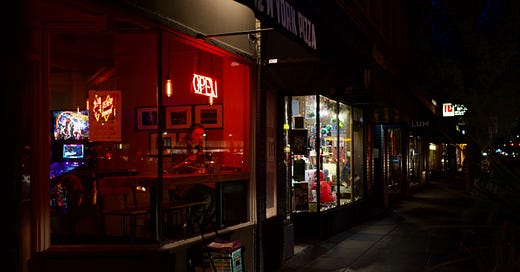Photo by Kevin Butz on Unsplash
I took off yesterday after a long week at a writing retreat at the Hindman Settlement School in Knott County, Kentucky. It was a rich, absurdly productive and peaceful week, working with writers and teachers and artists, preparing for the coming academic year. Teachers are the most hopeful people on the planet, and you can not not be filled with that contagious spirit when you work alongside them.
Sooo…here are TWO activities I like to use at the beginning of the year to invite students to write creatively:
1) write a micro story featuring a tiny moment with a beginning, middle, and end, and then….
2) write a follow-up poem called a “chaser”- something that adds a little extra flavor, a punch, a new wrinkle, a new layer to the original prose piece.
While there’s no accepted length for flash fiction (I’ve seen samples that range from 300-1500 words), micro-fiction generally refers to stories of fewer than 100 words.
There’s a myriad of names out there for this kind of writing, but whatever you call it, the power of this form is in its brevity. I like to start the year with flash fiction because it’s easily consumed like an appetizer in anticipation for the later courses of short stories and long form pieces we will read.
Here’s a sample piece from Richard Brautigan, “The Scarlatti Tilt”:
“It's very hard to live in a studio apartment in San Jose with a man who's learning to play the violin." That's what she told the police when she handed them the empty revolver.
Assignment #4:
Read a few samples of flash fiction and notice the brevity and compression in the lines. The setting is established with one or two sentences, the characters are few, the action straightforward. Some are more atmospheric like prose poems; others tell a story. All of them use concrete nouns and verbs to engage the reader.
Think of a moment/setting, and write one sentence that grounds the reader in place. “Joanie and Gary were sitting on the front porch when Mrs. Logsdon drove into the yard, knocking over the gazing ball, a rose bush, nearly killing Mr. Whiskers.”
Think of a small problem that trades on conflict. For the above story, let’s say Mrs. Logsdon has just discovered her husband has left her and she’s come to commiserate over coffee with Joanie and Gary’s mom.
Use limited dialogue and make it do double duty. The dialogue can enrich the characters while at the same time drop hints about backstory without weighing down the forward motion of the story.
Something changes by the end of the story- the place, the world, someone’s heart, someone’s allegiance, someone’s awareness. Some micro-fiction feature a surprise ending, but that’s not a requirement. Maybe only the reader is changed. (Spoiler: Mrs. Logsdon's husband has left Mrs. Logsdon for Joanie and Gary’s mom.)
After the story is written, have some fun with a “chaser,” a small poem that adds just a little bit of insight into something or someone in the micro-fiction piece. Maybe someone who didn’t speak during the micro-fiction gets a chance to speak and tell their story in the chaser. Maybe the setting or another inanimate object speaks; maybe the chaser illuminates the theme or the premise of the micro-fiction more brightly.
Student Sample
Mama, It’s me.
Do you remember when you took me down Maple street at first light, when the sky was purple ink bleeding into blue and sat me on the hill overlooking two big oak trees to watch the sun rise between them? Do you remember when you taught me how to take the crumbling soil in our modest backyard and give it life so that the seeds we scattered would grow lush, plump blackberries? Do you remember when you laid me under the stars each night for a month to memorize the constellations because, ‘a girl ought to know what the heavens look like since she’s bound to go there eventually’? Do you remember when we watched a bend in the winding country road for passing cars so we could guess their color before we even laid eyes on them? Do you remember the old abandoned barn we would lay in for hours as you read book after book to me, staring at the rafters above? Do you remember when you carried me home after I fell into a ditch while riding my bike, all bruised and bloodied as you sang lullabies in my ear? Do you remember when I came home from school with a large “A” circled on my paper and a goofy smile on my face and you stopped your sewing to take me to the nearest ice cream parlor, twenty miles away? Do you remember when we would watch the crisped leaves of autumn trees resign to the damp earth one by one until the branches were free? Do you remember on the winter days when the snow muted the world and we made hot cocoa that would burn our tongues on the first sip? Do you remember when my temper became too intolerable for you to bear so you took me to an empty field and ordered me to yell at the top of my lungs to get it all out? Do you remember making wishes on dandelions and ladybugs? Do you remember giving me those great hugs?
Chaser
On the days you cried
I kissed your eyes
and told you it was fine.
Of course I remember you
I remember it all
more than you could
ever stand.




